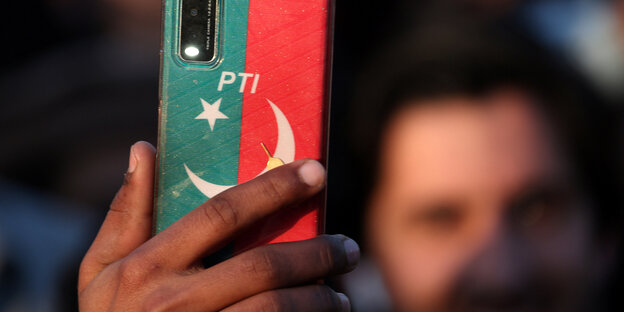In the elections, candidates close to imprisoned former Prime Minister Khan win the most votes. But they probably won't govern.

A supporter of Imran Khan's PTI party Photo: Fayaz Aziz/Reuters
MUMBAI taz | After Thursday's controversial parliamentary elections, the election results do not yet promise any easing of the tense situation in Pakistan. Most National Assembly seats were won by candidates close to jailed former Prime Minister Imran Khan's party (PTI).
In fact, the party – like Khan – was excluded from the elections. According to the electoral commission, independent candidates won 101 of 266 seats. Of them, 97 are close to the PTI. The favorite was Nawaz Sharif of the PML-N Muslim League, also a former prime minister, who won 76 seats. The Pakistan People's Party (PPP) is in third place with 54 seats.
Pakistan is a very young country and many young voters turn out in every election. They elevated the PTI – or the independent candidates – to a level that surprised many, Farhan Zaheer of the South Asia Institute at Heidelberg University tells Taz. “Many people inside and outside Pakistan thought that the PML-N was in a position to form a government,” but that was not the case, he explains. This means that nuclear power Pakistan faces a difficult phase in forming a government.
Meanwhile, Imran Khan took to social media with a victory speech, generated using artificial intelligence. Because the former cricket star is in prison, videos of Khan's speeches were created during the election campaign in which he does not speak, but rather a computer program generates new, ultra-realistic videos based on previous speeches. The victory speech says: “My dear countrymen! By voting in such large numbers and using their democratic right to vote, they have laid the foundation for the restoration of civil rights freedom,” the 71-year-old said. He urged his supporters to celebrate the “landslide victory” they achieved despite the “harsh repression” against the PTI.
Nawaz Sharif claims election victory
Never before has a politician in Pakistan achieved such electoral success without the support of the generals. However, in addition to Khan, his main rival, Nawaz Sharif, is also claiming electoral victory. The 74-year-old is a representative of the old elites and has already announced that he wants to form a coalition government.
A coalition with the Popular Party (PPP) would be obvious. Its president Bilawal Bhutto Zardari – part of the influential Bhutto family – was less interested in this before the elections. Expert Zaheer sees this as a reluctance to support Sharif as prime minister. He returned to Pakistan shortly before the elections. According to Zahmer, it would now also be possible for Shehbaz Sharif, Nawaz Sharif's younger brother and also a former prime minister, to take over again. He was already in office from April 2022 to August 2023.
“Both parties would have the support of the military if they formed a coalition,” says Zaheer. There is a high probability that the necessary number of independent candidates and local parties will join the alliance to form the government. According to media reports, several independents have already joined the Muslim League.
The Sharifs will now try to obtain a majority in the National Assembly. The first talks with the local MQM-P party took place on Sunday. As officially independent candidates, PTI-backed candidates do not have to vote along party lines to hold important positions. They can still change parties.
Khan won't give up without a fight
Furthermore, the PTI is not entitled to a share of the 70 “reserved seats” for women and minorities in the National Assembly, which are distributed according to the number of parties' votes in the general elections. The PTI leadership is also currently exploring how it can form the government, a senior advisor told the media. However, Khan, who is currently facing more than 30 years in prison, will not give up without a fight.
The elections in Pakistan are causing international concern: they have been marred from the beginning by communication blackouts, deaths from terrorist attacks and accusations of manipulation. The EU criticized the lack of equal opportunities as some political actors were excluded. The US State Department complained that the vote was held under unacceptable restrictions on freedom of expression, association and assembly.
“Given the situation in Pakistan, there is no question of fair and free elections,” said Green Party politician Shahina Gambir. However, the Pakistani Foreign Ministry confidently declared that the vote was peaceful and successful.